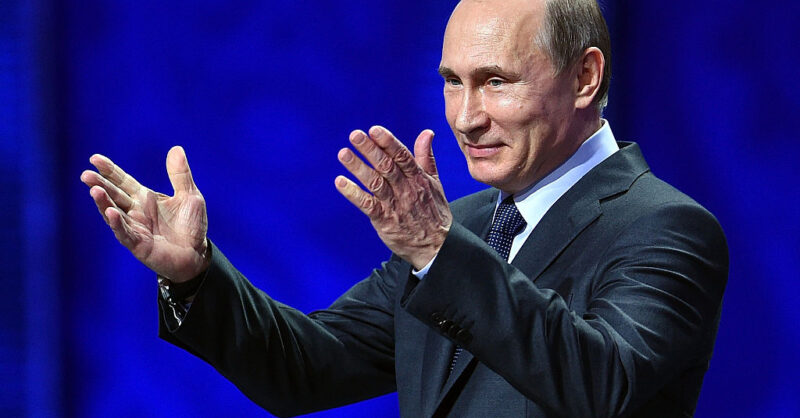Almost three years into Vladimir Putin’s unprovoked invasion of Ukraine – a war he appeared to be in serious danger of losing during the first 12 months – the Russian leader finds himself with an unexpected ally in Washington. Donald Trump appears determined not only to end the war on Putin’s terms, but to take down Volodymyr Zelensky’s government in the process.
“You should have never started it,” Trump said of the Ukrainian leadership at his Mar-a-Lago resort in Florida on 18 February. “You could have made a deal.” In reality, of course, it was Russia that invaded Ukraine, with Zelensky rallying his citizens to defend the nation against the full-scale Russian assault from the land, sea, and air. An early round of ceasefire talks fell apart in the spring of 2022 as the two sides failed to agree terms and the Russian military’s massacre of civilians in the Ukrainian cities of Bucha and Irpin was revealed.
On 19 February, Trump escalated his attacks on Zelensky, calling him a “Dictator without Elections” in a post on his Truth Social platform and warning the Ukrainian president that he “better move fast or he is not going to have a Country left”. Trump derided Zelensky as a “modestly successful comedian” and a “terrible” leader who wants to continue the war to “keep the ‘gravy train’ going”.
These are Russian talking points. Whether he knows it or not – or more likely just does not care – Trump is legitimising Putin’s warped argument for starting the war, according to which, Russia is not the aggressor, determined to destroy Ukraine as a sovereign state, but simply defending its own legitimate interests. In this parallel reality, Zelensky’s administration is portrayed as a puppet regime, following orders from the US and its Western allies in order to weaken Russia and bolster the nefarious defence industrial complex.
“I would like to have more truth with the Trump team,” Zelensky said at a briefing for reporters in Kyiv on 19 February, where he pointed out some of the most obvious errors in Trump’s recent statements. His approval rating is not 4 per cent, as Trump has recently claimed, but around 57 per cent, according to a poll conducted earlier this month, comparable to the US president. As any of Trump’s national security team should be able to tell him, elections have not been held in Ukraine since the start of the war because the country is currently under martial law, with around 20 per cent of its territory under Russian occupation and Ukrainian towns and cities under continuing bombardment. With the Russian military systematically targeting Ukrainian hospitals, schools, and civilian infrastructure, the Ukrainian government believes, rightly, that the polling stations needed to conduct an election would be vulnerable to attack.
“We have seen this disinformation. We understand that it is coming from Russia,” said Zelensky, lamenting that Trump “lives in the disinformation space”. He also pushed back on the Trump administration’s barely concealed attempt at extortion in recent days as he rejected the US claim to 50 per cent ownership of Ukraine’s rare earth minerals – worth approximately $500 billion – in return for the American military and economic aid provided since the start of the war. In fact, Zelensky noted, Washington has supplied a fraction of that amount, around $67 billion in weaponry and $31.5 billion in other support. “I defend Ukraine, I can’t sell our country,” he said.
The Kremlin’s propagandists, on the other hand, have responded with barely contained glee. Dmitry Kiselyov, a prominent state television host, for instance, praised the call between Putin and Trump on 12 February as a “devastating tsunami for America’s European allies”, delighting at the decision to exclude Ukraine and Europe from talks between the US and Russia in Saudi Arabia on 18 February. The Russian stock market and the rouble have surged since Trump’s call with Putin last week.
Of course, as Lawrence Freedman argues in this week’s NS, there is a danger of premature triumphalism. Trump proved capable of walking away from his talks with Kim Jong Un during his last term, despite their extraordinary bromance. Putin may yet overplay his hand, believing himself to be winning on the battlefield in Ukraine and encouraged by Trump’s apparent animosity towards Zelensky. But the early signs are decidedly ominous for Kyiv, and Europe. “We not only listened, but also heard each other,” said Russian foreign minister Sergei Lavrov, who is still technically subject to US sanctions over his role in the war, after the first round of talks in Riyadh. The US Secretary of State Marco Rubio praised the “incredible opportunities” to partner with the Russians, which he insisted would be “good for the world”.
There will now inevitably be a renewed round of innuendo around Trump’s ties with Russia and questions about whether he is, somehow, beholden to Putin. The phrase “Trump is a Russian asset” began trending on X after his attacks on Zelensky on 19 February. But the truth is likely more prosaic – and dispiriting. Trump simply admires Putin and his dictatorial rule. Beyond eyeing its mineral resources and perhaps a desire for payback over Zelensky’s unwitting role in his 2019 impeachment, Trump does not seem to care what happens, one way or the other, to Ukraine. He appears to share Putin’s belief that it should be left to them as the leaders of great powers – and great men of history – to carve up new spheres of influence for themselves. It is bitterly ironic that a leader who so clearly lusts after Putin’s strongman status, and campaigned on a mantra of “peace through strength”, has demonstrated such weakness in his approach to Russia so far, and seems to intent on a policy of peace through abject capitulation instead.
[See also: Will Europe abandon Ukraine?]
Content from our partners



